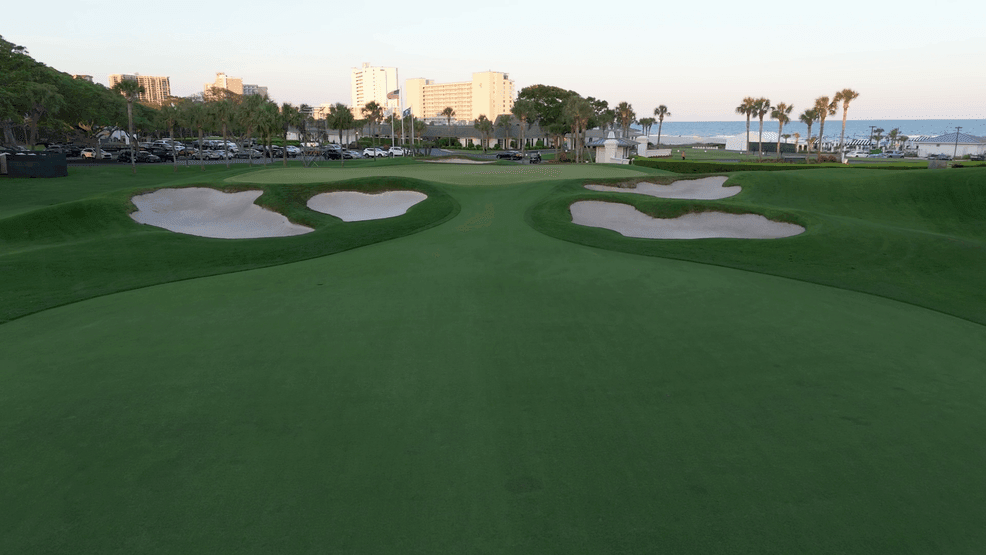MYRTLE BEACH, S.C. (WPDE) — For decades, the golf community along the Grand Strand has longed for professional golf to grace the area. Known nationwide for its abundance of golf courses, the region now welcomes the return of professional golf to the Dunes Club.
This course is recognized for its challenging distance, coastal beauty and its rich history, which played a pivotal role in shaping Myrtle Beach’s identity.
Bo Bryan, son of the Dunes Club founder Buster Bryan, shared the story of the club’s origins.
“There’s an epic story behind how this place got here,” he said.
Bo recounted his father’s determination to build the course after an insult at Pine Lakes Country Club.
“My daddy came home from the war and was insulted by something they said to him at Pine Lakes Country Club. And he came home and said, James, let’s build our own golf course,” Bo said.
George “Buster” Bryan, with the help of his brother James, secured over 200 acres of land along the Singleton Swash.
“Daddy was a lawyer, so he knew how to research and find out what he didn’t know,” Bo said, also remembering that Buster served as a wartime prosecutor in World War II. “That research, I guess, led him to Robert Trent Jones, who was probably not an easy man to get to. He was world-famous by that time. He was a preeminent golf architect in the world.”
Despite financial challenges, Buster’s resolve never wavered. Bo recounted a story he heard from family friend Jimmy De’Angelo, who was also a founding father of the Dunes Club.
“He stood up, put his hat on, and looked that man square in the eye and said, I didn’t come here to talk liquidation,” Bo recounted. “And turned around and walked out.”
The founders eventually found out-of-state investors, ensuring the completion of the course thanks to local hoteliers like Joe Ivey, who, like Buster, through his own money into the course and original clubhouse construction.
“When he [Buster Bryan] set his mind to something, if you were standing in the way, he’d try to talk you out of it,” Bo recalled. “And if you wouldn’t move, he’d try to buy you out of it, and if you still wouldn’t move, he’d just go around you or roll over you or whatever he had to do, and that was pretty much how the golf course got finished.”
Clearing began in 1948, and nine holes and a clubhouse were completed by 1949.
The Dunes Club became Myrtle Beach’s second golf course, marking the beginning of a new era for the Grand Strand’s hospitality industry.
As Bo recalls it, his father’s innovative advertising strategies helped establish Myrtle Beach as a premier golf destination.
“He started advertising in the golf magazine. It was the first one. And then he went to Golf Digest and Sports Illustrated. Nobody else in Myrtle Beach could do it. And it worked. He came up with a $129 three-night and four-day price for a golf package,” Bo said.
Now, decades later, professional golf returns to the Dunes Club for the second consecutive year. As did Bo, walking the fairways that also shaped his childhood.
“What sticks with me most is how free I felt out here. After school, on the afternoons. I would come out here and play golf by myself. I’d walk the fairways and carry my own clubs. I did that every afternoon,” he said.
While Bo doesn’t play golf much anymore, he remembers playing out there and the lessons the game provided him. He also looks back at the tenacity his father had to make it all possible. A dream that’s now a reality and one Bo thinks the founders of the Club would have been elated to see.
“They’d be amazed, man. Are you kidding me? The PGA is coming to town!”
When his father served as the President of the Dunes Club, Myrtle Beach hosted a surprising U.S Women’s Open.
From there, generations of golf talent have walked the course that Bo and his father, Buster, once played. Generations of new businesses and communities were born out of the resort tourism that the Dunes Club ushered into the region after the closure of the Ocean Forest Hotel.
By the time of his passing, George “Buster” Bryan was recognized as a civic leader in Myrtle Beach. If you ask Bo, he certainly puts his father at the top of the names who shaped the Myrtle Beach we all know and see today.
One of a group of golf buddies, who had a vision and, like the game itself, they dug in, waged risk against reward, and for Buster, he became known as the ‘Father of the Dunes’.







